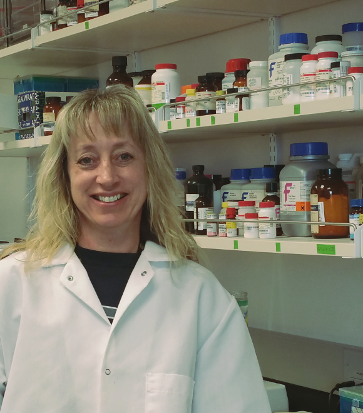|
After receiving her Ph.D. from the University of Arizona, Soil, Water and Environmental Sciences program in 1999, Timberley is now an Associate Professor in the Department of Integrative Biology at the University of Colorado Denver downtown campus. Her research focuses on the response of bacteria to chemicals, such as heavy metals, pesticides and antimicrobials. Working in exotic locations, including in acid mine pits, industrial waste streams, and, of course, sewage treatment plants, Timberley’s goal is to increase our understanding of the intersection between the human and microbial worlds in order to protect us and the environment. |
|
Microorganisms, including bacteria, fungi, algae, protozoa and viruses, are found everywhere and are feared everywhere. Yet, our very existence depends entirely on microorganisms, from those living in and on our bodies to those living in our food, soil and water. We can live without them no sooner than we could live without oxygen. But this relationship is precarious as some microorganisms can cause devastating diseases. And, in spite of our daily efforts to control microorganisms, they continue to thrive, which is just as well since we need them to grow our food, make our medicines, degrade our wastes, and keep us healthy. So how do we come to terms with living with these organisms? Even with our understanding of the human microbiome, the importance of microorganisms in preventing disease, and the role microorganisms play in keeping our environment clean, for many, the goal is to kill as many as possible, to exclude them from our daily lives in order to prevent and control disease hence the overuse of antibacterial and antiviral chemicals in many household items. The catch is this, as we strive to control microorganisms, we create stronger, more aggressive microorganisms that are harder to control. As we face a future of widespread antibiotic resistance, decreasing vaccine effectiveness and increasing spread of disease, is the solution to continue to try to control microorganisms? If so, we’ll lose the war. And, there is so much we have yet to learn about microorganisms. Much microbiology research focuses on disease-causing organisms, but what about the other 90-99% of microorganisms that we know nothing about? The fear of the unseen is strong, but we know so little about the microorganisms living in, with and around us that at what cost do we blindly try to kill them? Since the first version of this Café presentation in 2010, we now know that microorganisms communicate with each other much like we do to establish fully functional communities; we now know that microorganisms can communicate with and influence our own cells’ behavior; and we now know that microorganisms play a bigger role than previously thought in mitigating chemical toxicities. Given that the majority of known microorganisms are beneficial to us and our environment, what are we losing in our efforts to kill as many microorganisms as possible and can we afford the risk? Recommended reading/listening: A website (sponsored by the American Society for Microbiology) with weekly podcasts and videos about the field of microbiology. Another website sponsored by the American Society for Microbiology summarizes recent findings in the field of microbiology in a series of press releases.
|

 Timberley Roane initially fell in love with toxic waste and microorganisms while working at a sewage treatment plant in Davis, CA, as an undergraduate student at the University of California, Davis. When she realized that microorganisms alone can turn human sewage into clean water, she thought to herself “Bacteria can save the world” and has since dedicated herself to the pursuit of “super bacteria” capable of degrading and detoxifying toxic chemicals.
Timberley Roane initially fell in love with toxic waste and microorganisms while working at a sewage treatment plant in Davis, CA, as an undergraduate student at the University of California, Davis. When she realized that microorganisms alone can turn human sewage into clean water, she thought to herself “Bacteria can save the world” and has since dedicated herself to the pursuit of “super bacteria” capable of degrading and detoxifying toxic chemicals.